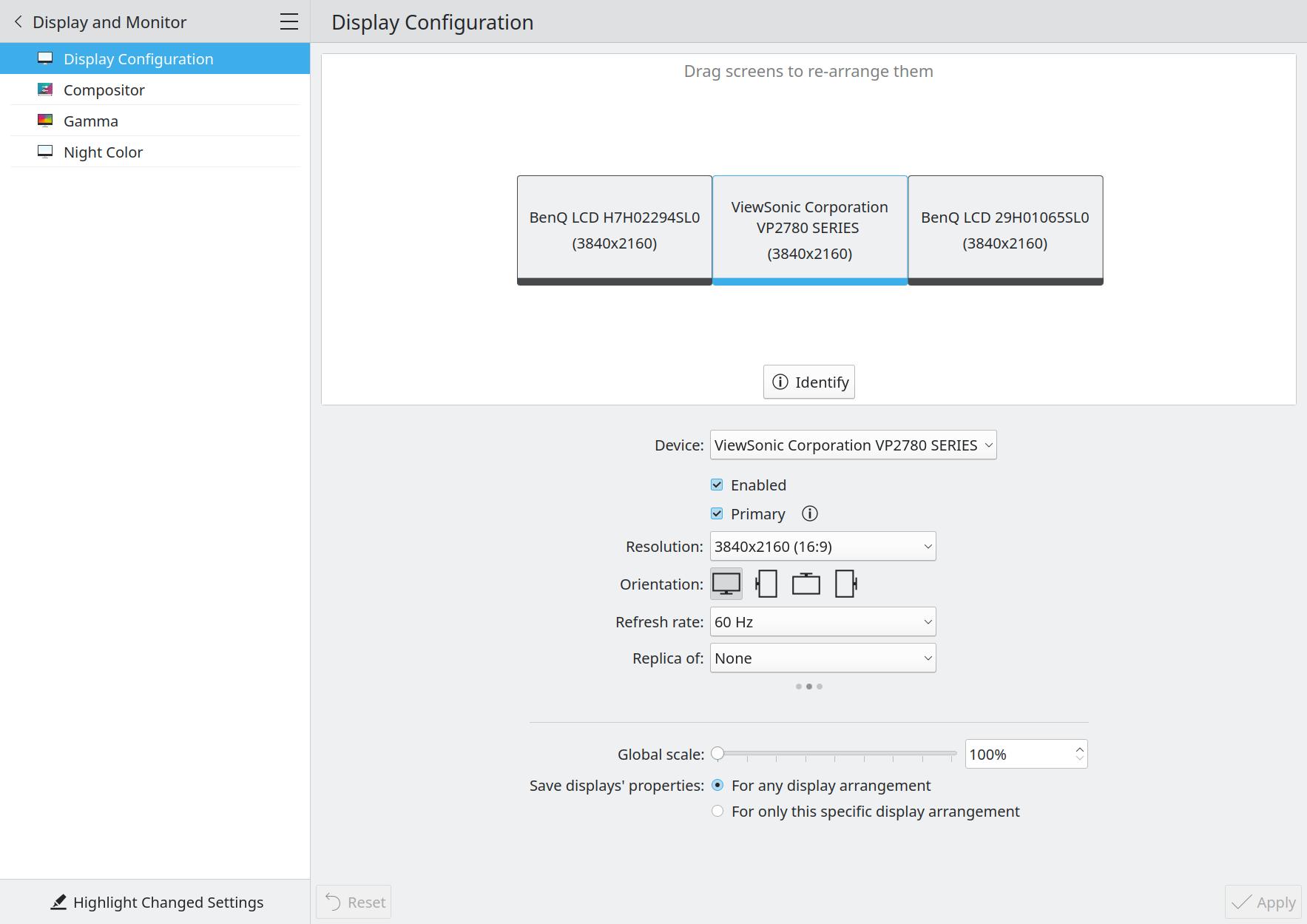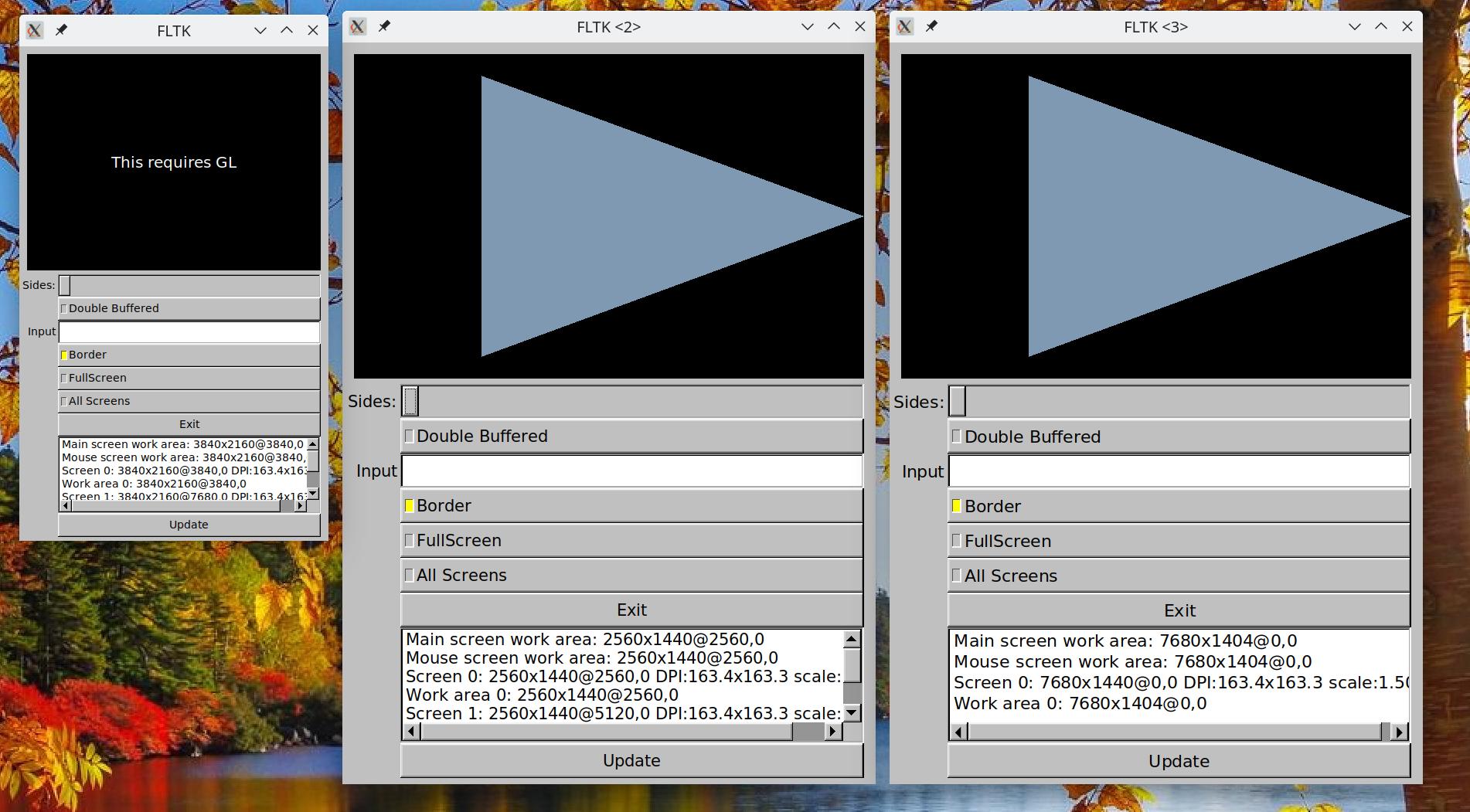Strange Fl::screen_... results in 1.4
Tigercat
FLTK Version: 1.3.5
Known monitors: 3
Monitor 1: 3840x2160 (7680,0)
Monitor 2: 3840x2160 (0,0)
Monitor 3: 3840x2160 (3840,0) [Primary Screen]
Workspace: 11520x2160
FLTK Version: 1.4.0
Known monitors: 1
Monitor 1: 11520x2106 (0,0) [Primary Screen]
Workspace: 11520x2106
Monitor 1: 2560x1440 (5120,0)
Monitor 2: 2560x1440 (0,0)
Monitor 3: 2560x1440 (2560,0) [Primary Screen]
Workspace: 7680x1440
Manolo
Manolo
Tigercat


origin/HEAD)
Author: Albrecht Schlosser <scrub email addr>
Date: Sat Nov 12 20:14:44 2022 +0100
Reformat Cairo support Fl_Cairo.cxx for CMP compliance
Only formatting, no code changes.
So this local git fetch is from a few weeks ago. (I have a few different projects using FLTK that I sporadically update.)
origin/HEAD)
Author: Albrecht Schlosser <scrub email addr>
Date: Sat Nov 26 21:59:03 2022 +0100
Update dependencies
My default KDE scaling is 150%, and both of these 1.4.0 windows pick that up and scale appropriately. (Curiously enough, one of my FLTK projects stopped automatically scaling with 1.4.0 a few weeks ago; I'm still trying to sort that out as well.)
name of display: :0
version number: 11.0
vendor string: The X.Org Foundation
vendor release number: 12101004
X.Org version: 21.1.4
etc. etc.
Tigercat
Ian MacArthur
Unless you have any quick idea of what's going on, I can try to git-bisect the issue back to where it began.
Ian MacArthur
Or, could try setting the FLTK environment variable FLTK_BACKEND (though TBH I can't remember the valid values...) or perhaps even just try setting WAYLAND_DISPLAY to something invalid... (like "none") for your existing build.Actually, that's a thought - what does your system report WAYLAND_DISPLAY as?
Manolo
Manolo
Tigercat
FLTK Version: 1.4.0
Monitor 0: 2560x1440 (2560,0) [Primary Screen]
Monitor 2: 2560x1440 (0,0)
So it is picking up the three monitors correctly, and it's identifying the primary screen correctly (the one in the 'middle' of three monitors).
Tigercat
* HAVE_XINERAMA
*
* Do we have the Xinerama library to support multi-head displays?
*/
#define HAVE_XINERAMA 1
Manolo
Getting closer. My testcase (and the original codebase) now report:GCC Version: 11.3.0
FLTK Version: 1.4.0Known monitors: 3
Monitor 0: 2560x1440 (2560,0) [Primary Screen]Monitor 1: 2560x1440 (5120,0)
Monitor 2: 2560x1440 (0,0)Workspace: 7680x1440
So it is picking up the three monitors correctly, and it's identifying the primary screen correctly (the one in the 'middle' of three monitors).However, the resolution is still off. The monitors are 4K 3840x2160 monitors, but the current fltk (commit 1b0754ce4db888b01b291d64330751fe0a77eafc) has them as 2560x1440.
Manolo
BTW, the xinerama setting in config.h is set:/*
* HAVE_XINERAMA
*
* Do we have the Xinerama library to support multi-head displays?
*/
#define HAVE_XINERAMA 1
At the moment I'm using configure+make to build in the FLTK tree. My main project uses autotools.I'm under the impression CMake is the 'future' for FLTK. Would the developers recommend that I migrate the build of FLTK to CMake? As I'm on Gentoo access to build systems is not a problem :-)
Manolo
… and test apps in <FLTK source tree>/bin/test/
Ian MacArthur
Le mercredi 30 novembre 2022 à 01:50:12 UTC+1, Tigercat a écrit :I'm under the impression CMake is the 'future' for FLTK. Would the developers recommend that I migrate the build of FLTK to CMake? As I'm on Gentoo access to build systems is not a problem :-)
Yes, CMake is expected to progressively supplant configure as building tool.But configure remains supported by FLTK.
Tigercat
Albrecht Schlosser
This is a somewhat off-topic response to one of the comments below, not the main topic of the post!
On Wednesday, 30 November 2022 at 03:17:43 UTC Manolo wrote:
Le mercredi 30 novembre 2022 à 01:50:12 UTC+1, Tigercat a écrit :
I'm under the impression CMake is the 'future' for FLTK. Would the developers recommend that I migrate the build of FLTK to CMake? As I'm on Gentoo access to build systems is not a problem :-)
Yes, CMake is expected to progressively supplant configure as building tool.But configure remains supported by FLTK.
Maintaining two entirely different build systems (and keeping them in sync) is something we might not do for all times...
CMake is the build system we *must* maintain because Visual Studio and other IDE's require using CMake to build the project files.
configure/make is ... well, old-fashioned and really difficult to maintain.
Though note that (perhaps as here?) they two build systems may not match exactly at all times as development proceeds, and that *in general* the cmake system is a little more likely to be fully "up to date" at any given point as things evolve.
Also, the cmake system seems to be better at detecting and handling dependencies as files change - the dependency generation in our autoconf setup is not 100% reliable and sometimes misses dependencies that cmake does detect.
There is only one working workaround: if users have the `makedepend` tool installed on their system they can execute `make depend` (note the space) in the FLTK root directory *after* configure/make and later whenever they use `git update` or change FLTK sources or the configuration. This is error prone and I recommend strongly to switch to CMake whenever possible - at least for building the FLTK libs.
On the other hand, the fltk-config that the cmake system generates is sometimes a bit wayward; I've found that it is inclined to miss compiler flags (such as optimizer settings) and sometimes image libs, that the autoconf generated version does seem to handle correctly.YMMV.
My goal here is that CMake will be a fully functional and feature-complete replacement of our configure/make system when FLTK 1.4.0 will be released. In the future CMake should always be the "better" build system, i.e. a functional superset of our configure/make system, and CMake is definitely superior in detecting build dependencies.
Albrecht Schlosser
>
> At the moment I'm using configure+make to build in the FLTK tree. My
> main project uses autotools.
>
> I'm under the impression CMake is the 'future' for FLTK. Would the
> developers recommend that I migrate the build of FLTK to CMake? As I'm
> on Gentoo access to build systems is not a problem :-)
I would appreciate if you migrated the FLTK build to CMake at least for
testing and give us feedback about issues and problems.
Currently there are still some known issues in the CMake build but these
should be fixed soon. If you don't encounter build problems and plan to
update the FLTK sources from time to time, then the unreliable
dependency detection in the configure/make system might cause you
trouble which you can avoid by using CMake to build FLTK. There's no
problem if you always do a full build with either system.
Once FLTK 1.4.0 is released the CMake build should be the preferred and
superior build system and I would definitely recommend using it to build
FLTK, especially because of the working dependency detection for
incremental builds after source code updates.
Tigercat
Ian MacArthur
On 11/30/22 11:52 Ian MacArthur wrote:
This is a somewhat off-topic response to one of the comments below, not the main topic of the post!
Also, the cmake system seems to be better at detecting and handling dependencies as files change - the dependency generation in our autoconf setup is not 100% reliable and sometimes misses dependencies that cmake does detect.
To be precise: the autoconf (configure/make) build system is unreliable in almost 100% because we don't (and we can't!) maintain dependencies for all potential configurations.
There is only one working workaround: if users have the `makedepend` tool installed on their system they can execute `make depend` (note the space) in the FLTK root directory *after* configure/make and later whenever they use `git update` or change FLTK sources or the configuration. This is error prone and I recommend strongly to switch to CMake whenever possible - at least for building the FLTK libs.
Greg Ercolano
On 11/30/22 09:21, Tigercat wrote:
Works for me. As an old-time Unix guy I use autotools most of the time because I'm usually just targeting Linux/Gnu, but for those times I do cross-platform Windows/Mac/Linux work I also find CMake is usually the best of the (all-problematic) options. I'll switch over and watch for issues.
The biggest thing cmake gave us was Windows support for
Visual Studio.
We had to manually maintain separate IDE files for different
VS versions
which was a giant pain in the but, and made for unnecessarily
large tar files
for all those separate project files and junk. With cmake, it
generates those
'on the fly' so we don't have to include them in the tar
files.
I'm sure Albrecht, who's our cmake wizard, would also chime in
about many
other benfits, not the least of which localizes each build in
a separate directory,
making it easier to build the same source code (on a file
server) built across
platforms without crosstalk in the source directories.
I get the impression cmake is a bit of a large undertaking to
learn fully,
but honestly so is automake/configure. I never really
understood the
underbelly of either one, so I tend to hand craft Makefiles
myself
and avoid IDEs so my apps and FLTK can be build via scripts.
At least
cmake allows that to be possible without the handcrafting,
which is fine with me..!
Ian MacArthur
I get the impression cmake is a bit of a large undertaking to learn fully,
but honestly so is automake/configure. I never really understood the
underbelly of either one, so I tend to hand craft Makefiles myself
and avoid IDEs so my apps and FLTK can be build via scripts. At least
cmake allows that to be possible without the handcrafting, which is fine with me..!
